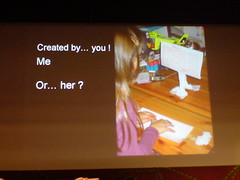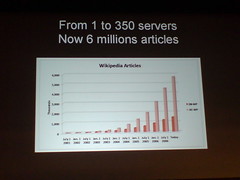LIFT07: Keynote, Florence Devouard, Chair of the Board, Wikipedia
The setup here in the conference room is very good indeed. Desks, comfortable chairs, power at every point, and wifi that seems to cope with everyone.
LIFT 07 Keynote: Florence Devouard, Chair of the Board, Wikipedia
Some themes for today: collective intelligence, collaborative creativity, ICT in education, the digital divide, is there a risk in going too virtual.
Show of hands: about half the room have edited a Wikipedia page.
"Imagine a world in which every single person is given access to the entire knowledge of humankind"
First barrier to remove is the linguistic barrier. "We write in languages which have no encyclopedia". Second is removal of a commercial barrier: making it free as in beer and free as in speech. Wikipedia can be re-used as you wish.
Not everyone has a computer. Lovely slide of Skeletor editing the "He-man" entry on Wikipedia.
Wikipedia in the top 10 visited sites in the world, above Youtube, Fox, etc. We plan to print and distribute books.
Show's the logo of the Wikimedia Foundation: "no-one knows about it".
3 advantages of Wikipedia over traditional encyclopedias:
- Collecting data locally or globally
- Manipulating huge sets of data
- Reactivity: commentary and updates to the information
We have unlimited space today. There are no limits to information sharing. Before Wikipedia there was a notion that knowledge has boundaries: that some of it is relevant, other stuff is irrelevant. We no longer have to determine what's relevant for inclusion into the encyclopedia: it's about what's relevant to you.
We try to hand out complete, factual and relevant information - it's up to readers to make up their minds. Most web sites have an agenda... e.g. web sites about GMOs tend to select what information they will present to you, rather than helping you make up your own mind (I found exactly this when researching Landmark).
"The culture" - it's about empowering individuals. They used to get panicked support calls from novice users worried that they could edit content on the site, thinking they shouldn't be able to. Similarly they get calls from people saying "such and such a page isn't correct". The answer? "Go and fix it for yourself".
Wikipedia is about "a priori trust": "we open the gates rather than closing them". We can block vandals, but by default we consider people to be good. This is quite different to the rest of society.
"The problem about Wikipedia is that is just works in reality, not in theory" - Stephen Colbert.
Growth: from 1 to 350 servers, 6 million articles. "We need $5m". Currently reliant on gift economy: donations from individuals, on average $20.
Q: You mentioned that the Swiss are the most active citizens on Wikipedia (relatively speaking)?
A: We have figures for articles in each language and readers, but little about contributions (as they can be anonymous). We have 50k accounts created, which (obviously) doesn't include anonymous people.
[more talk about financing of the service]
They have enough finances to keep them going for another 3 months. We're not here to make money or to be sold - we're here for the common good.
Q: How much of a problem is security or vandalism? Are there parts of Wikipedia so vandalised they can't be used?
A: Basic vandalism is not a problem. We can block large-scale changes ("this article sucks"). More of a problem are slight, small changes (e.g. changes in dates), people trying to edit their own articles (e.g. politicians removing embarrassing facts), or commercial content (not so much spam), and using sites like MySpace as sources.
Florence joined Wikipedia just before the Iraq war, and as a predominately English language service we found ourselves presenting an American-biased opinion. She had to edit the site anonymously (as she's French and that wasn't a fun thing to be when talking about Iraq ;))


